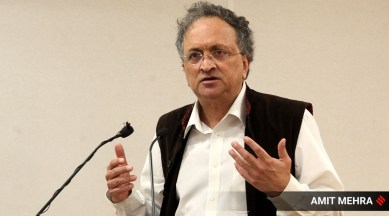Hope ‘Rebels Against the Raj’ is read by Indians of all political persuasions: Ramachandra Guha
Guha names leaders, political parties and organisations across the world who he believes can learn from the lives of the remarkable foreigners featured in the book.

His latest book Rebels Against the Raj: Western Fighters for India’s Freedom, including chapters on Annie Besant and Madeline Slade, is meant as a work of historical scholarship not political advocacy, says historian-author Ramachandra Guha who hopes it will be read by Indians of all persuasions.
The book is a group portrait of seven foreigners — four British, two American, and one Irish — who fought for India’s independence from British colonial rule and did pioneering work in across several fields, including journalism, social reform, education, and emancipation of women.
monthly limit of free stories.
with an Express account.
The eclectic list of seven well-known and lesser-known personalities comprises Annie Besant, BG Horniman, Philip Spratt, Richard Ralph Keithahn, Samuel (later Satyanand) Stokes, Madeline Slade (later Mira Behn), and Catherine Mary Heilemann (later Sarala Behn).
“This is a work of historical scholarship, not of political advocacy. I hope that readers will see this book both as biography and history… as an exploration of India’s encounter with the modern West via these seven Westerners who became Indian… Of course, the book contains some lessons for the present (and future too) but these are understated and implicit,” Guha told PTI in an e-mail interview.
“I do not intend to preach to the reader, but to inform and educate (and perhaps occasionally also entertain). Given the range and diversity of these lives, I hope the book is read by Indians of all political persuasions,” he added.
The ‘implicit’ lessons — along with the context — are explained in the book’s prologue where the 63-year-old scholar writes on how the lives and doings of these individuals constitute a “morality tale” for the world we currently live in.
“This is a world governed by paranoia and nationalist xenophobia, with the rise of jingoism in country after country, and a corresponding contempt for ideas and individuals that emanate from outside the borders of nations,” he writes.
Guha names leaders, political parties and organisations across the world who he believes can learn from the lives of the remarkable foreigners featured in the book.
“Narendra Modi and the Rashtriya Swayamsevak Sangh in India, Donald Trump and the white supremacists in America, Boris Johnson and the Brexiteers in England, Xi Jinping and his Confucian Communist Party in China — all see themselves as uniquely blessed by history and by God. No foreigner, they believe, can teach them anything. The book tells us that they can,” claims the author widely known for his two-volume biography of Mahatma Gandhi.
Guha has been collecting material from archives for the book for the past two decades but started working full-time on it only after the second volume of his Gandhi biography — “Gandhi: The Years That Changed The World” — was published in October 2018.
The idea of writing the “group portrait” first occurred to Guha in 1999 when his biography of Verrier Elwin, the British-born anthropologist who became a leading scholar of and spokesperson for the adivasis, was released.
One of Elwin’s regrets was that he never went to jail in India’s cause, and Guha decided that for this book he would only focus on individuals who “completely identified with their adopted country as to go to jail or be deported by the colonial state”.
“.. I got down to focused, full-time work on this only after the second volume of my Gandhi biography was published. Then I began to organize my notes collected over the years, and realized, to my pleasure, that I had much more material than I had thought. I wrote a draft in 2019 , and then began revising it during the pandemic. I don’t think I have enjoyed writing a book as much as this one,” he said.
Published by Penguin Random House India, the 496-page “Rebels Against the Raj: Western Fighters for India’s Freedom” is priced at Rs 799. It was released on January 20.
Besant was a strong supporter of India’s self-rule and served as the first woman president of the Indian National Congress. Horniman, editor of nationalist newspaper ‘The Bombay Chronicle’, was a staunch campaigner for the freedom of press. Satyanand laid the foundation of the horticulture industry in Himachal Pradesh.
Mira Behn devoted her life for the advancement of Gandhi’s principles. Spratt fought for workers’ rights and campaigned against the license-permit-quota Raj. Ralph Keithahn worked for self-reliance among the oppressed and helped found a rural university and a charitable hospital. Sarala Behn established a girls’ school in Uttarakhand and trained and nurtured several generations of social workers.
📣 For more lifestyle news, follow us on Instagram | Twitter | Facebook and don’t miss out on the latest updates!